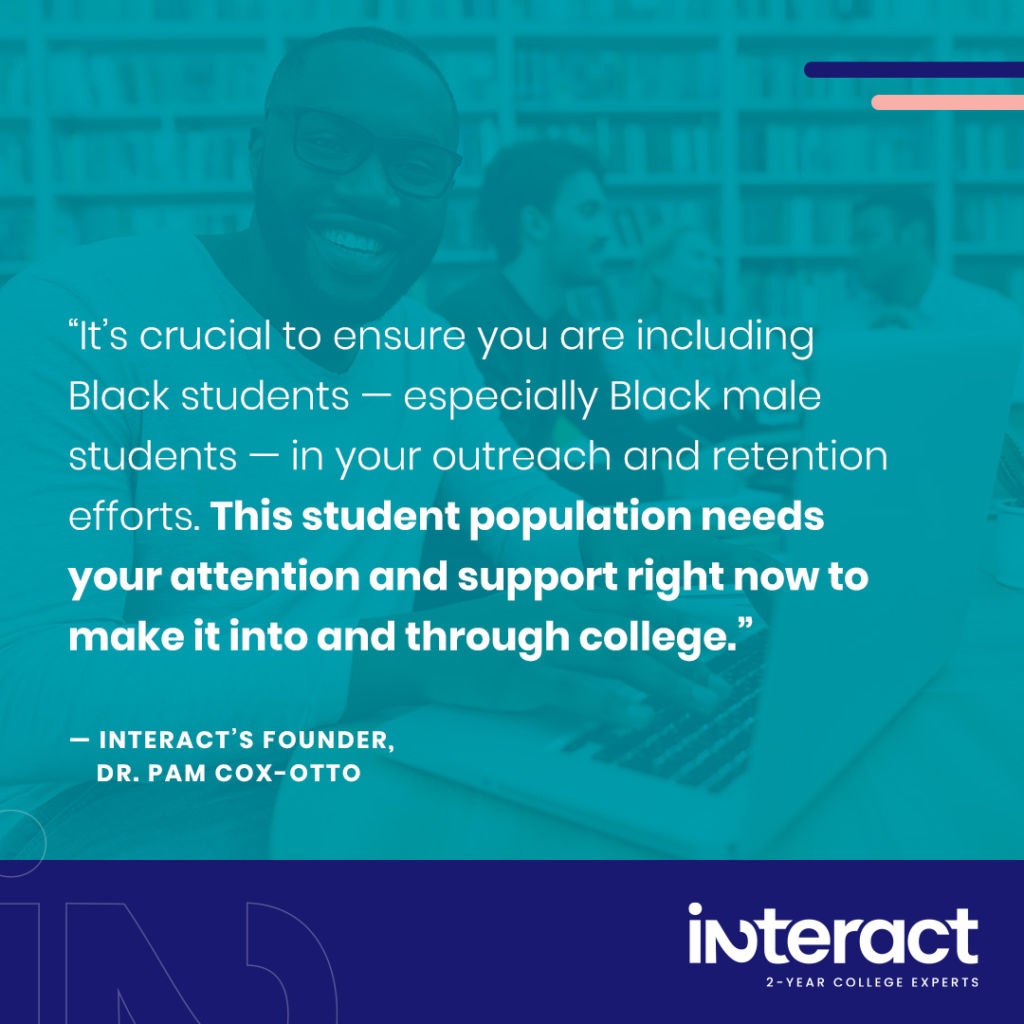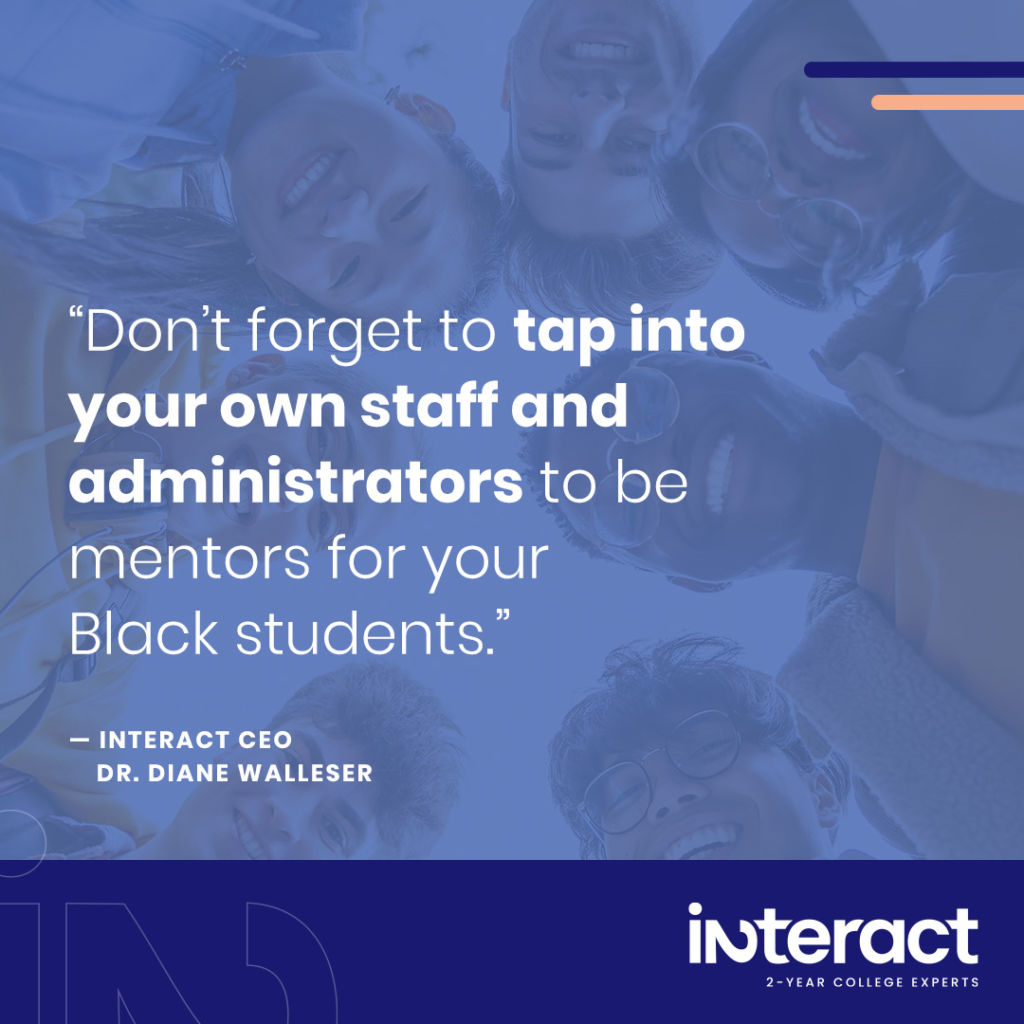As our founder, Dr. Pam Cox-Otto, says, “Celebrating Black History Month shows your students that you value diversity and demonstrates your inclusion efforts. It should be part of a well-rounded outreach and retention plan to help diverse students feel welcome in February — and 365 days a year. Remember, honoring Black History Month 2024 is just one piece of any solid DEI year-round plan.”

Are you ready to find out why the monthlong celebration is important in higher education and what you can do to observe it? Then read on!
How Did Black History Month Get Started?
The month was initiated by Dr. Carter G. Woodson, a pioneer of African American history and the founder of the Association for the Study of Negro Life and History (ASNLH). The observance started as Negro History Week and was first celebrated in 1926 in the second week of February.
By 1950, Negro History Week had gained momentum. And after the Civil Rights Movement in the 1960s, the weeklong commemoration gained increasing prominence, expanding into the national celebration of Black History Month in 1976.
On the first officially recognized Black History Month, President Gerald Ford called on Americans to “seize the opportunity to honor the too-often neglected accomplishments of Black Americans in every area of endeavor throughout our history.”
Why Do We Celebrate in February?

Because Abraham Lincoln, the Great Emancipator, and Fredrick Douglas, a formerly enslaved person and abolitionist leader, were born during that month. In fact, the NAACP was also founded on February 12, 1909, to commemorate Lincoln’s birthday!
Black History Month 2024 is the perfect opportunity to recognize the contributions of Black Americans throughout U.S. history … and beyond! In fact, Canada also celebrates Black History Month in February. Meanwhile, countries including the United Kingdom, the Netherlands, and Ireland honor it in October.
Reasons to Celebrate Black History Month
The month is an opportunity to honor Black leaders and innovators, especially those whose contributions haven’t received the recognition they deserve.
“Black History Month is that time for African Americans to acknowledge key figures from our past and present. It’s an opportunity to spotlight and celebrate the achievements that African Americans have accomplished in this country, despite the history of racism and oppression.
“When we celebrate Black History Month, we aren’t just celebrating Black history. We are celebrating American history, which belongs to all Americans. By collectively and consciously celebrating Black history, we come together and continue to rewrite the narrative of our diverse nation.”
— The Importance of Celebrating Black History All Year Long, Vericast
There are many great reasons to celebrate Black History Month 2024. First and foremost, education creates change. Supporting educational efforts this month and the rest of the year can help move the needle on diversity and inclusion issues. And learning from the past can help us make a better future.
Plus, it’s important to underscore that Black history isn’t just about slavery. It’s crucial to explore the many positive contributions the Black community has made to every aspect of our society and culture.
“Much of African American history has been left out of American history. In public schools, students mostly learn about American heroes who are not Black. Rarely are students taught that past presidents owned slaves. Instead, they’re taught diluted stories of the African American experience that gloss over the rich history of Black contributions that have shaped the country.”
— Why Is Black History Month Important?, BestColleges.com
Why Is Black History Month Important in Higher Education?

As Martin Luther King, Jr. said, “The function of education is to teach one to think intensively and to think critically. Intelligence plus character — that is the goal of true education.”
During this monthlong observance, it’s time to recognize the achievements of Black people and honor those who are creating much-needed diversity, equity, and inclusion efforts. It’s also crucial for students to see Black role models, professors, and leaders they can look up to in the educational system and their career fields.
While our society has made great gains in diversity, equity, and inclusion, there is still a long way to go. That’s why it’s critical to observe Black History Month 2024.
“Witnessing excellence among figures who they can relate to culturally and physically is critical for planting seeds of greatness in Black children.
“Until our learning tools reflect sufficient coverage of Black Americans and other minority groups, we must continue to elevate Black History Month as a unique period of learning and reflection.”
— Black History Month: Still Critical, Still Relevant, Regina S. Wright, Associate Dean for Diversity & Inclusion at the University of Delaware
How Celebrating Can Help Black Students Feel Welcome on Campus
Unfortunately, men of color are leaving community college at very high rates, creating a huge drop in diverse student populations. From fall 2019 to fall 2021, Black male student enrollment declined by nearly 24 percent, according to New America.
“It’s crucial to ensure you are including Black students — especially Black male students — in your outreach and retention efforts,” says Cox-Otto. “This student population needs your attention and support right now to make it into and through college. Honoring Black History Month 2024 is a good way to show this demographic that you’re attuned to their needs.”

For more, read Avert a Male Student Enrollment Crisis: How to Market to Young Men.
Observing Black History Month 2024 as part of your larger outreach and retention efforts can help these students feel more welcome on campus and encourage them to return and persist.
Here are some ideas to help you get started:
- Host fun and informative Black history events and share them across your social media platforms. Ideas include poetry slams, concerts featuring Black artists, and educational lectures.
- Encourage your affinity clubs to host special activities and outreach during this month.
- Showcase your Black mentors’ and faculty members’ inspiring stories on your social media platforms. Let students know how they can connect with them.
Highlight Your Affinity Groups and Relevant Student Services During Black History Month
So often, community colleges offer a full menu of student support services … but students don’t know about them.
During February, it’s a great time to remind students of any unique affinity groups, mentor programs, and services specifically for Black students.
Put extra signage in the student services center, post on social media, and include these resources in your next newsletter. The extra attention might be all it takes to help students persist in their studies.
You could also highlight your Black academic advisors and counselors during this month. Honor their contributions to the college while letting students know they are available to help. Students are often more comfortable asking for support when they feel represented among your staff.
“Don’t forget to tap into your own staff and administrators to be mentors for your Black students,” says our CEO, Dr. Diane Walleser. She says you can find powerful mentors in unlikely places, including the accounting office, research department, or security team.

“These untapped resources have powerful stories to share about their own successes and struggles,” says Walleser. “This begins to build community and connection for your students of color and can be a critical first step in opening the door to other valuable college resources that can support them along the way.”
How to Be a Good Ally
What does it mean to be an ally? In The Corporate Sister blog, 10 Ways to Be an Ally to Black Women at Work, Solange Lopes states, “An ally is someone in a position of privilege who supports and acts in solidarity with members of unrepresented groups.”
Here are some great places to start being an ally to your college’s diverse community 365 days of the year:
Listen

The most important first step is to listen. “Don’t interrupt people as they speak. Try to acknowledge what you’ve heard before going on to make another point,” says the Interaction Institute for Social Change. If you haven’t experienced something the speaker is sharing, try to accept their different perspective.
Whether you are an academic counselor or an instructor, practicing deep listening for your diverse students and coworkers can help them feel included and that you have their backs.
Take Time to Educate Yourself
Congrats! You’ve taken the first step to being a good ally by reading this blog.
“There is always more to learn about different identity groups and about how others experience oppression; without this knowledge, expressions of allyship can ring hollow,” says the Learning for Justice Magazine.
Reading books, watching movies, and listening to podcasts about Black history are all good places to start. Whether you are a teacher and want to assign special readings this month or an administrator looking to increase DEI awareness amongst staff, it’s always a great idea to keep learning.
Looking for some good places to begin? The 10 Must-Read Books for Black History Month by Voice of Witness, an oral history and human rights nonprofit, includes Between the World and Me by Ta-Nehisi Coates, Their Eyes Were Watching God by Zora Neale Hurston, and Beloved by Toni Morrison. Meanwhile, BestCollege’s 10 Movies to Watch This Black History Month include The Hate U Give, Summer of Soul, and Just Mercy.
Plus, check out our robust resource list at the end of this blog for even more great ways to help educate yourself and your community.
As the Guide to Allyship says, “Anyone has the potential to be an ally. Allies recognize that though they’re not a member of the underinvested and oppressed communities they support, they make a concerted effort to better understand the struggle every single day.”
Useful Resources to Celebrate Black History Month

Below are resources that faculty, staff, and administration can utilize to help educate students and the community throughout Black History Month 2024:
- The African American History Month website has great articles, classroom activities, and historical videos. You can also check out their events for the whole month of February.
- The Center for Racial Justice in Education has a wonderful reading list and Black History Month resource guide.
- The National Endowment for the Humanities website EDSITEment! has a robust historical and cultural teacher’s guide, including African-American arts, culture, literature, and poetry.
- The National Park Service has an interesting collection of stories and articles to help reflect on Black history in national parks. They also offer an entire educator’s portal with opportunities and lesson plans.
- Look Beyond the Struggle to Celebrate Black Achievement: This article by Edutopia has an in-depth list of Black American achievements to share this month.
- The New York Public Library offers the Treasures: Voices in Black History reading list, sharing the experiences of Black writers, artists, activists, and more.

Famously, when the Smithsonian Institute opened the National Museum of African American History and Culture in 2016, Director Lonnie G. Bunch III said the following:
“There is no more powerful force than a people steeped in their history. And there is no higher cause than honoring our struggle and ancestors by remembering.”
How does your college plan to celebrate Black History Month 2024?



